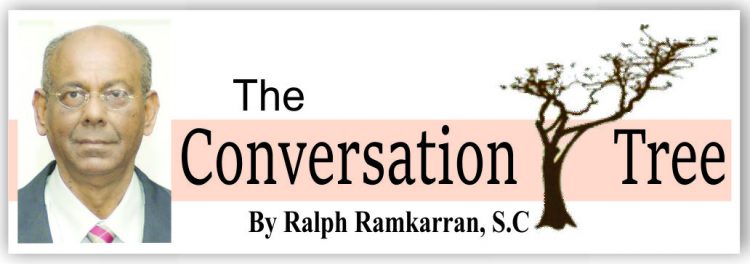 The boastful bravado of the Nicolas Maduro/Delcy Rodriguez political duopoly, mirroring the audacious and nefarious plots of the Venezuelan ruling elite, has been dented by the decision of the International Court of Justice (ICJ). Their gloating responses that Guyana lost because the Court did not reject or alter the questions to be posed in the referendum, as Guyana asked the Court to do, is the faux triumphant noises of the defeated.
The boastful bravado of the Nicolas Maduro/Delcy Rodriguez political duopoly, mirroring the audacious and nefarious plots of the Venezuelan ruling elite, has been dented by the decision of the International Court of Justice (ICJ). Their gloating responses that Guyana lost because the Court did not reject or alter the questions to be posed in the referendum, as Guyana asked the Court to do, is the faux triumphant noises of the defeated.
The ICJ rebuffed Venezuela on Friday by ruling that “pending a final decision in the case, the Bolivarian Republic of Venezuela shall refrain from taking any action which would modify the situation that currently prevails in the territory in dispute, whereby the Co-operative Republic of Guyana administers and exercises control over that area.” In other words, the ICJ decided that Venezuela must do nothing that would ‘modify the situation that currently prevails’ over Essequibo, which Guyana administers and over which it exercises control. This stops Venezuela in its Bolivarian tracks from invading Guyana or from issuing passports or ID cards to the residents of Essequibo, as it had clearly planned to do.
Guyana had argued that if Venezuela proceeded with its referendum to create a Guayana Esequiba state, to issue citizenship to its residents and to incorporate the area on the Venezuelan map, its “plausible” rights would be directly threatened and irreparably harmed because, if the Court finally rules in Guyana’s favour, Venezuela would have already occupied Essequibo. It was a “particularly exemplary” situation in which its rights would be “irremediably threatened” and needed to be preserved. Venezuela responded to Guyana’s arguments by proposing that holding a consultative referendum is an exercise of sovereignty and none of the outcomes of its proposed referendum will have any adverse impact on Guyana’s “alleged” title over the “disputed” territory and even less create a risk of irreparable harm. The Court rejected the second limb of this argument.
Pursuant to article 41 of its statute the Court has power to order provisional measures, which Guyana was seeking, when irreparable prejudice could be caused to rights which are the subject of judicial proceedings or when the alleged disregard of such rights may entail irreparable consequences. However, the Court noted that its power will only be exercised if there is urgency in the sense that there is a real and imminent risk that irreparable prejudice will be caused to the rights claimed before the Court gives its decision. The Court said that the condition of “urgency” is met when the acts that could potentially cause irreparable prejudice can occur at any time before the Court makes its final decision.
In considering the issues of “irreparable prejudice’ and “urgency,” the Court noted the fifth question in the referendum. It refers explicitly to the “creation of the Guayana Esequiba State,” as well as “an accelerated and comprehensive plan [to] be developed” for the “granting of Venezuelan citizenship and identity cards” to residents of Essequibo. The Court also noted the Venezue-lan military officials announcing measures to build an airstrip to serve as a “logistical support point for the integral development of the Essequibo;” the appeal of the Venezuelan Minister of Defence, General Vladimir Padrino Lopez, on 6 November 2023 to “go to combat” with reference to the Essequibo;” and the description by President Maduro on 3 December 2023 of the referendum as the “first time that all arguments – political, diplomatic, legal, historic, territorial – are given to our people so that we take a collective decision as a country.” These statements, the ICJ said, suggest that Vene-zuela is taking steps with a view towards acquiring control over and administering the territory in dispute.
In arriving at its decision outlined in the first and second paragraphs above, the Court decided that the circumstances present a serious risk of Venezuela acquiring and exercising control and administration of the “territory in dispute” The Court concluded that there is a risk of irreparable prejudice to the right claimed by Guyana in the proceedings. The Court further found that Venezuela’s expressed readiness to take action with regard to the “territory in dispute” in these proceedings at any moment following the referendum scheduled for 3 December 2023 demonstrates that there is an urgency, in the sense that there is a real and imminent risk of irreparable prejudice to Guyana’s plausible right before the Court gives its final decision.
The Court’s findings and conclusions against Venezuela are so overwhelming, the dangers posed against Guyana so palpable and the actions and words so threatening to Guyana, that it is mystifying that Venezuela would even initiate a referendum of this nature at this time, while the issue is before the ICJ. Its patently prejudicial nature is so obvious that no one could reasonably expect that Venezuela would succeed in this brazen endeavour. But perhaps the necessity to deploy threats to Essequibo are so compelling for internal political reasons that Venezuela had no choice. Venezuela is under heavy US pressure to hold free and fair elections next year to remove the burden of sanctions which, together with corruption and drug running, have crippled the Venezuelan economy. Maybe the electoral frenzy whipped up by the prospect of seizing Essequibo will return the Maduro/Rodriguez political duopoly and Venezuela’s tainted ruling class to power.




